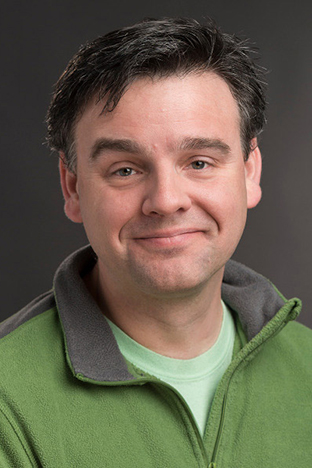
Trainee Spotlight: Nolan Green
Nolan Green is a 4th year PhD candidate in the Chemical and Biomolecular Engineering Department. Originally from originally from Erie, PA, he graduated in 2020 from Wake Forest University and is currently working in Dr. Marty Burke’s lab developing a small molecule mimic of hemoglobin. He also works with MMLI’s Thrust 5 to implement AI/ML and automated organic synthesis into the undergraduate curriculum at UIUC. [Click above to read more!]

Faculty Spotlight: Richard Zanibbi
Richard Zanibbi is a professor at Rochester Institute of Technology, coming to RIT and MMLI from a postdoc fellow position at the Centre for Pattern Recognition and Machine Intelligence at Concordia University in Montreal, Canada. Richard directs the Document and Pattern Recognition Lab, which helps MMLI identify new methods to extract molecules from PDFs.[Click above to read more!]
MMLI Trainee Spotlight: Nolan Green!

What is your background and describe your current work/role/lab and the project you are most excited to be working on right now
I’m originally from Erie, PA, I graduated in 2020 from Wake Forest University, and I’m currently a 4th PhD Candidate in Prof. Marty Burke’s group working on developing a small molecule mimic of hemoglobin. My work in MMLI’s Thrust 5 pertains to implementing AI/ML and automated organic synthesis into the undergraduate curriculum at UIUC. Across April we get to actually get in the lab with the students and implement our now three different courses that we’re offering across Gen Chem 1, Gen Chem 2, and Organic 1. It’s way more exciting to actually get in the lab than sit around brainstorming changes to the education materials.
What drew you to MMLI?
Getting to do curriculum and outreach development alongside my thesis research felt like a really unique experience at the university, and because of my interest in ultimately having some teaching role in my career, it was a pretty quick decision to get involved.
What has been your favorite part of being a part of MMLI?
The best part has definitely been getting to engage with a wide range of students. Across the different initiatives, the team has developed experiences from 2nd grade all the way up to the graduate level and seeing students either light up with amazement or reach out about potential research opportunities has been so fulfilling to see and feel like the activity was worth it.
How do you like to spend your free time? (or what would you do for fun if you had more free time!)
It’s a lot of watching sports. Whatever sport is on, no matter the season or league, it’s getting thrown on my TVs when I get home from lab.
Fun fact (or extremely average fact) about yourself you would like to share.
I love random college merchandise. I definitely have over 20 different schools represented in my closet and am constantly rotating through them.
MMLI Faculty Spotlight: Let’s meet Richard Zanibbi

What is your background/what did you do before your current role?
I was an NSERC postdoctoral fellow at the Centre for Pattern Recognition and Machine Intelligence at Concordia University in Montreal, Canada.
What is your current position/short description of what you are working on right now with MMLI.
I am a professor of computer science at RIT, where I direct the Document and Pattern Recognition Lab. For MMLI we are working on new methods for extracting molecules from PDF files using both PDF drawing instructions and images. Our approach is designed to be relatively general, and applicable to other diagram and notation types (e.g., math, flowcharts, etc.).
What drew you to MMLI (or your lab)?
I have been working in document recognition and information retrieval for years. The extraction and information pipelines needed for mining the literature for MMLI fit well within those areas, and I was interested in exploring a new domain to broaden my understanding of these tasks, and to collaborate with other researchers in computing and chemistry interested in using our extraction models for scientific applications.
How do you like to spend your free time?
Trying new foods with family and friends, choral singing, and biking.
Fun fact (or extremely average fact) about yourself you would like to share.
My first undergraduate degree was a Bachelor of Music from Queen’s University, Canada.